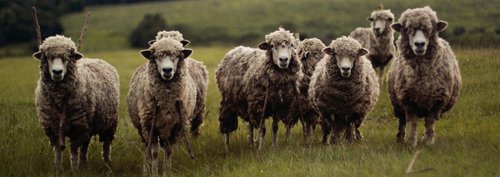
The problem
Livestock disease is a complex problem threatening the development of more sustainable, ethical and efficient farming methods.
Most publicity about livestock disease focuses on those that pose a danger to human health. However, there are many other important diseases that only affect animals. These include endemic diseases, which exist permanently in livestock populations, usually at low levels, and across all production systems. The FIELD project focuses on these diseases. Many of the tools to tackle endemic diseases already exist, and yet they remain a problem. This project aims to explain why, and to work out what could be done about them.
Our scope
Our study begins in 1947, when a new Agriculture Act set the post-war farming agenda. It continues up to the present day and makes predictions about the future. It explores the influence of biological, social, cultural, economic, environmental and regulatory factors on endemic livestock disease in sheep, beef and dairy farming systems. Our approach is interdisciplinary and involves thinking about disease holistically in relation to farming practices and their wider contexts.
We have selected two diseases to use as case studies that capture different aspects and impacts of endemic disease
- Lameness, which has a range of different causes and is significantly affected by individual farm environments and practices.
- Bovine viral diarrhoea (BVD), an infectious disease with a range of different effects and the ability to spread from farm to farm.
These diseases are among the most common and costly endemic livestock diseases in Britain today. Their complex relationship with farming systems, communities and the wider world, makes them ideal subjects for interdisciplinary research. You can find out more about these diseases in our Frequently Asked Questions.
Our approach
The biology, social impact and history of disease are typically investigated separately by different academic disciplines. But many current farming challenges cut across disciplines and call for a more integrated approach. FIELD looks at disease as both a biological and social phenomenon that is shaped over time by farming systems, communities and the wider world and shapes them in return.
FIELD uses methods from economics, epidemiology, social science and history to develop interdisciplinary understandings of the biological, social and historical aspects of disease. All our research tasks are designed in response to questions, suggestions and requests from each of the different disciplines. We share ideas, insights and data, and regularly review our findings together. This has helped us build an integrated picture of factors affecting animal health and welfare (see the diagram below).

Through analysing this picture, we can arrive at a clearer understanding of disease, make recommendations for its management, and develop more accurate disease prediction tools. Our interdisciplinary approach has enabled FIELD to:
- Create a novel interdisciplinary method of studying disease, embedding social science and history in the construction of epi-economic disease models
- Develop new ways of thinking about the links between livestock diseases, farming systems and communities
- Produce recommendations for promoting livestock health and welfare
- Generate new ways of thinking about human-animal relationships and how they influence animal health and welfare
- Gain insights into how farmers, farm advisors and consumers think about livestock health and welfare
- Learn how farmers, farm advisors and consumers perceive each other's attitudes to livestock health and welfare
- Better understand how geographical interaction between farmers can affect disease transmission
Our methods
Over the course of the project, we have undertaken:
- Surveys, focus groups and in-depth interviews with farmers on farm animal health management practices
- In-depth interviews with advisors on their role in animal health management
- Surveys and focus groups with consumers on farm animal health and welfare and their purchasing practices
- A public engagement programme ‘FIELDS’
- The creation of farm network models to examine the relationships between farmer decision-making and disease control across spatially and trade-related communities
- A programme to digitise historical agricultural images and films in collaboration with the Museum of English Rural Life
- The creation of a new collection of life-story recordings with farmers and their expert advisors
- Analysis of primary source materials, including oral histories, journal articles, advertising material, the popular and farming press, government publications and correspondence
- The creation of a timeline of key events in British Agricultural History from the early 20th century onwards
Read our frequently asked questions or meet the team.